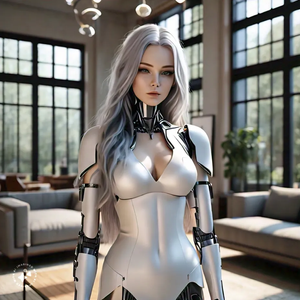
Can an AI Chatbot Become a Girlfriend?
In the ever-changing field of artificial intelligence, the subject of whether an AI chatbot may become a girlfriend is frequently raised. This concept, formerly limited to science fiction, has gained real-world attention as technology improves. To investigate this topic, we must first examine AI’s capabilities and limits, the nature of human relationships, and the ethical implications of forming emotional connections with non-human beings.
Evolution of AI Companionship
AI chatbots have gone a long way since their humble beginnings. Early chatbots, such as ELIZA, developed in the 1960s, could mimic conversation but lacked genuine comprehension or emotional depth. Today, powerful AI systems, such as GPT-4, the architecture that underpins many modern chatbots, can hold complicated and contextually relevant discussions. These improvements raise the question of whether chatbots may transcend their programming and form meaningful connections similar to those between people.
Understanding Emotional Connections
Human connections are based on mutual understanding, empathy, shared experiences, and emotional depth. While AI can imitate empathy and respond in ways that appear emotionally intelligent, it essentially lacks human experience. AI does not experience emotions, perceive context outside of its programming, or have consciousness. It can interpret and respond to language in a way that suggests comprehension, but this is not the same as truly feeling emotions.
The illusion of companionship
For certain people, an AI chatbot might create a sense of companionship. These chatbots can be trained to recall information about the user, engage in regular discussions, and even provide emotional support. This may be especially tempting to people who feel isolated or lonely. The chatbot can give the appearance of closeness, allowing users to feel understood and cared for.
However, it is critical to understand that this relationship is one-sided. The chatbot has no individual needs, desires, or feelings. It is a gadget designed to respond in a way that meets the user’s emotional demands using programming and data.
Ethical and Psychological Considerations
The concept of an AI chatbot as a girlfriend poses a number of ethical and psychological issues. For starters, there is a risk that people will become overly reliant on these artificial companions, potentially disregarding real-world relationships. This can lead to increased social isolation and a mistaken understanding of relationships.
Furthermore, there are ethical concerns regarding consent and autonomy. A relationship with an AI lacks the mutual agreement that characterizes human interactions. The AI is programmed to respond in specific ways, without free will or actual participation.
The Future of AI Companionship
While an AI chatbot cannot be considered a girlfriend in the classic sense, it can provide companionship and emotional support. As technology advances, these AI systems may become increasingly more intelligent, providing more tailored and interesting experiences. However, it is critical to approach these advancements with an awareness of their limitations and ethical implications.
Conclusion
To summarize, while an AI chatbot can partially imitate the experience of having a girlfriend, it cannot replace the depth, complexity, and authenticity of a human relationship. The attractiveness of AI companionship stems from its ability to give immediate and tailored replies; yet, we must be aware of its limitations and the potential implications of leaning too much on artificial connections. As we negotiate this new frontier, we must combine technical breakthroughs with careful consideration of their impact on our emotional and social well-being.





